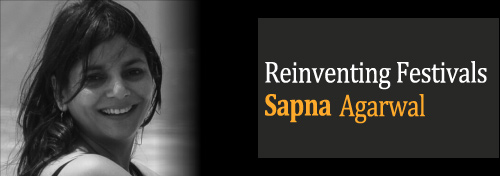Reinventing Festivals
As a little girl growing up in Rajasthan I was surrounded with festivals – Diwali, Holi, Rakhi, Sankrant, Teej, Gangaur,… the list became even longer since the boarding school I went to observed even Parsi , Sindhi, Christian and Islamic festivals.
Every festival held its own charm. Shivratri meant fasting all day to get special late night dinner, Janmashtmi meant panjiri and late night bhajan singing sessions, Basant Panchmi meant a trip to the elegantly decked up in white jasmine flowers Music Room to sing “Aeyyy Shardey maa” at the top of our childish voices. Festivals added colour to our ‘uniformed’ blue and maroon life and were easily the high points of our existence in the hostel.
Two years in a Social work college though dimmed the rosy hue around the same festivals. Seen through gender, equity and environmental lenses most festivals lost their shine revealing their unstated biases, unequal consumption and unfair assumptions. Was it right, for instance, to burst crackers knowing many firework factories employed nimble fingered children? What about the pollution? What about Teej? Was it really a celebration of womanhood? Or another symbol of the gold polished shackles that bound us tightly to our patriarchal society? But the festival that I felt let down most by was Rakhi. The soft silk bands that I proudly hand wove for my troop of brothers throughout girlhood began to smack of gender bias.
For a woman who loved her festivals this personal and social awakening came at a heavy cost. I loved the rituals surrounding festivals. They were a part of my culture, my roots, my history, my memories but I equally cared for my ideals – Equality, Freedom, and Equity were not just words in my newly enlarged dictionary. They were principles I wished to live by. I trudged along in this confused stupor till the kids came along.
And then I hit upon it – My own solution. I began to undress the festivals. Layer by layer, I reached the core of each festival, examining each ritual associated with it as I unpeeled it. I discovered that though sometimes the problem lay in the shrouds (the outer peels so to say) many times it lay at the core, at the very premise of the occasion. Like in Rakhi! Or Raksha Bandhan!
The crux of Raksha Bandhan as any seven-year old worth her salt will tell you is that ‘A sister ties a Rakhi to her brother and the brother promises to protect her from all harm’. The presumption being that a sister needs ‘protection’ and that a brother is ‘able’ to provide it. The assumed roles – sister the ‘taker’, brother the ‘giver’ emerged centuries ago from the then prevailing social milieu. In today’s urban middle class – upper middle class context they are chauvinistic at worst and redundant at best.
Here is what we have done in our family with Raksha Bandhan:
- All younger brothers/sisters tie Rakhi to their older siblings irrespective of their sex
- In order to inculcate the ‘giving’ spirit each of them gives a ‘gift’ to all the others. To make gift giving more meaningful, the children are encouraged to use money from their own piggy banks. Counting out the money, deciding on a budget for each of their brothers/sisters and then choosing a gift the recipient will like are challenging for little minds. Besides teaching them basic finance and budgeting it also makes them more attuned to other’s desires and needs.
- We insist that they pack their gifts themselves and add a short personal note to each one of them encouraging expression and creativity.
This Raksha Bandhan, my seven years old got his older sister a bottle of nail paint. Not something that I would buy, but the shine in her eyes told me he had made the ‘perfect’ choice. Her comic book to him was received with equal gusto. The gifts are ‘smaller’ but the photographs brim with happy faces and loving embraces. I know we are on the right track. Especially when in an essay written for her Hindi lesson, my daughter wrote “ pehley key jamaney mein behan bhai ko rakhi bandhati thi aur bhai uski raksha ka vachan deta tha par ab mein bhi apney bhai ki raksha karney ka promise karti hoo”
Welcome to the modern Rakhi!
A mom of two, Sapna is a business woman, an avid book lover, a stand in decorator for her restaurants, a movie buff, a social worker by training and a “change maker” by choice. A dreamer, like her name suggests, she says she is dangerously sentimental and an idealist at heart. Married to her childhood sweetheart she lives in a small city in Rajasthan with her kids Maya 8 yrs. and Kabir 7 yrs. She started blogging a year back and uses her blog justanotherwakeupcall to make new friends and connect with people.

